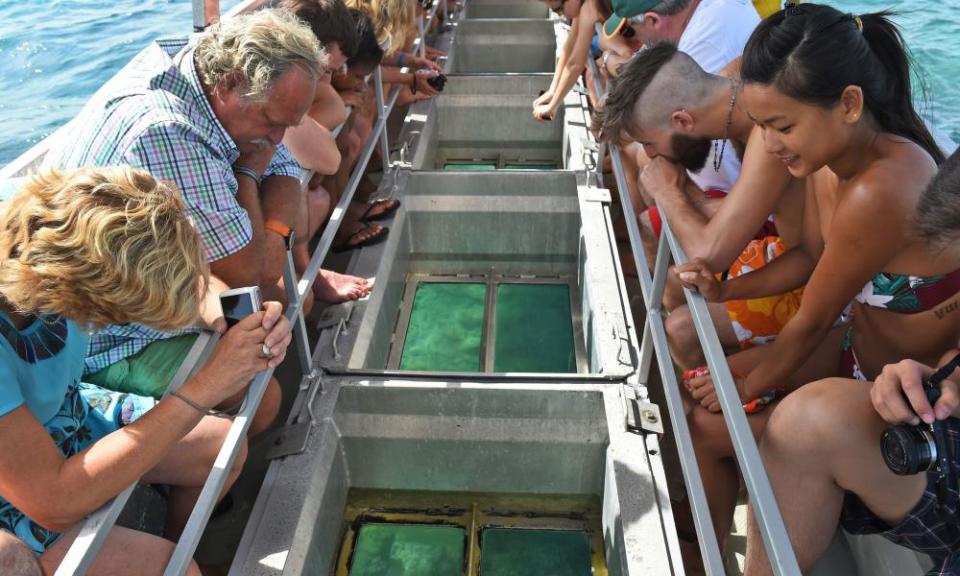Australia's tourism industry pleads for government help as borders stay shut

Tourism chiefs are pleading with the federal government to extend jobkeeper-style payments to its sector’s workers beyond March, after predictions that international travel will not resume this year.
Darren Rudd, the Australian Federation of Travel Agents chief executive, told Guardian Australia he had spoken with the tourism minister, Dan Tehan, on Monday, and that he supported the idea of further help for the industry.
However, Rudd believed there were some cabinet ministers who still needed to be convinced the sector deserved extra support above other industries.
On Tuesday, Scott Morrison did not rule out further support for the tourism sector.
“I’m not going to pre-empt or fly kites on these things,” the prime minister said while in Queensland, pointing out that domestic travel remained the “bread and butter” of the industry, accounting for 70 to 80% of the sector.
Related: Herd immunity is not the only goal of vaccinating Australians during the pandemic | Hassan Vally
“We make the decisions about what’s necessary after working closely with those in the sector about what is needed ... That’s how we’ll continue to approach this,” Morrison said.
Morrison’s comments came a day after the health department secretary, Brendan Murphy, said substantial international travel was unlikely to resume before 2022 – a warning that prompted a strong reaction from the already wounded industry.
Rudd said that 40,000 of their members had contacted their local MPs asking for extended support.
“It is needed, but it will be under another name because the government has given its word it will end jobkeeper.”
Rudd said the industry, worth $46bn a year before the pandemic, was already reeling from a “mass exodus of skills and knowledge” since the initial border closure in March last year.
“People are making this move out of necessity. They’ve loved their job, but more will have to go unless there is an extension of support.”
Without holidays to book, Rudd said travel agents had mostly spent the last year retrieving $6bn of the $10bn Australians were owed from travel cancellations stemming from Australia’s border closure last year.
“If more workers leave it will be very hard to claw that money back for Australian consumers.”
He also said with fewer employees, the sector would not be well placed to maximise the potential benefit tourism can bring to the economy when international travel fully resumes. He predicted the industry could exceed $46bn when borders reopen, from pent-up travel demand.
On Monday, Murphy said that arrivals from well-vaccinated countries were unlikely to be granted quarantine-free entry. Rudd said he believed the government should prioritise working with countries with low community transmission, such as New Zealand, Singapore and Japan, on opening two-way travel bubbles.
Michael Johnson, the Tourism Accommodation Australia chief executive, told Guardian Australia any extension of support beyond the jobkeeper cutoff should be “bespoke”, noting that some regional hotels were booked out due to intrastate travel, while many hotels in the central business districts of capital cities had very low occupancy rates.
“Some (CBD hotels) are even below 5% capacity, with no positives in sight.
“We need that bespoke support so that we don’t lose some of this country’s great hotels and tourism operators, because international tourism will be an important part of our recovery at some stage, when borders reopen.”
Graham Turner, the Flight Centre founder and chief executive, told Guardian Australia that Murphy’s prediction that widespread vaccine rollout may not result in the resumption of international travel this year, was disappointing.
“I can’t see the issue. If everyone in a country is vaccinated and someone brings the virus in, they’re only spreading it to people who are vaccinated, who can’t get sick from it. I can’t see the logic behind quarantine in that case,” Turner said.
He believed the government was trying to downplay how important vaccination was, as part of a tactic of underpromising and overdelivering.
Turner also said the government should communicate with the travel industry on which foreign countries have announced vaccine programs the Australian government trusts, so the industry can prepare for bookings with the countries most likely to be allowed quarantine-free entry to Australia first.
Turner said while an extension of jobkeeper-style payments would help the industry, greater certainty on domestic borders would help more.
Earlier on Tuesday, Margy Osmond, the Tourism and Transport Forum chief executive, said the sector could not survive on domestic travel alone, particularly if state borders kept closing.
“There is no way that domestic tourism can fill the gap that will be left by inbound international travel,” she told the ABC.
Osmond said an average tourist from China spends about $8,500 while they’re in Australia, while an average domestic Australian tourist spends about $1,500.
“Make no mistake, while international borders remain closed, we have no hope of recovery.
“The government is going to have to think very seriously how it supports this industry for the next couple of years, not just the next couple of months, if it wants to have a tourism industry when we actually reopen our international borders,” Osmond said.
With Australian Associated Press

 Yahoo Finance
Yahoo Finance 